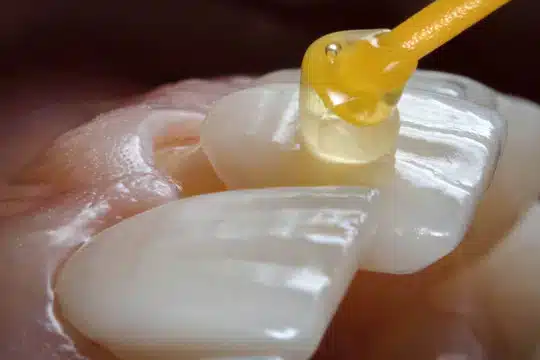When choosing between two options, people often tend to choose the one that is healthier. The same principle applies when someone decides to get dental work done. Porcelain veneers are quite popular these days as they can give you that perfect Hollywood smile without looking unnatural.
But as opposed to crowns and bridges that have been for a long time now, porcelain veneers are a relatively new procedure. And as such, there is still some confusion about the safety of these dental shells.
If your dentist has already explained the procedure, you may be aware that it requires shaving your enamel. Will this harm your teeth or weaken them? And is porcelain safe for your mouth?
We have answers to all these questions on your mind. Dr. Lavoyger Gies who runs a family and cosmetic dentistry in San Antonio joined us for a quick chat to discuss the safety aspect of porcelain veneers.
Are Porcelain Veneers Harmful to Your Teeth?
Summary Answer:
Porcelain veneers are not inherently harmful to your teeth when placed correctly by a qualified dental professional. However, they require the removal of a small amount of enamel, which is irreversible, and this can make teeth more sensitive and dependent on the veneers for protection. If poorly placed or maintained, veneers can lead to complications such as tooth decay, gum irritation, or veneer failure.
According to the American Dental Association (ADA) and peer-reviewed journals, when done properly, porcelain veneers are biocompatible, durable, and can last 10–15 years or more with good care. But they are not reversible.
When To Use Porcelain Veneers?
Porcelain veneers are thin dental shells that can be used to hide various types of teeth imperfection such as:
● Discolored teeth
● Teeth gaps
● Misshapen teeth
● Unevenly sized teeth.
They are made from ceramic material porcelain and are tooth-colored for seamless blending.
The veneers can be used to fix more than one tooth and hence can give you a beautiful smile.
The procedure starts with your dentist shaving some of the enamel from the tooth. This ensures the veneers don’t protrude and sit comfortably with the rest of your teeth.
The dentist will then create a mold of your teeth to fabricate a custom veneer. It can take up to 2 weeks for the dental laboratory to create these veneers. Once they are ready, your dentist will fit them to the front of your teeth using special glue.
Are Porcelain Veneers Safe
Yes Porcelain Veneers is Safe. Porcelain veneers are sturdy, long-lasting, and stain-resistant. They have been helping thousands of people regain their lost confidence by giving them beautiful smiles.
Yet many people believe that veneers are harmful to natural teeth and should never be used. This is simply not true. Yes, when you get veneers you do have to lose some of the protective enamel from your teeth. But dentists will remove only a tiny quantity leaving behind enough enamel to protect your tooth.
In fact, porcelain veneers protect your teeth from damage by covering up exposed dentin.
Some patients do experience increased sensitivity after getting veneers. But the problem goes away after a few days.
Porcelain is also a biocompatible material. This means it won’t cause any allergic reactions or release toxins in your mouth.
How Long Do Porcelain Veneers Last?
First and foremost, porcelain veneers are not a permanent fix. Porcelain veneers typically last between 5-10 years with good oral hygiene and home care.
The life of dental veneers depends on how well they are taken care of. Grinding teeth at night (bruxism), using your teeth to break stuff, and clenching the jaw (temporomandibular joint disorder) can all quicken the degradation of porcelain veneers.
If you brush your teeth twice a day, floss once a day, and eat healthy foods, they can last anywhere from 10-15 years, maybe more. However, if you don’t take care of them properly, they may start to chip or peel after two or three years.
So it is of utmost importance to follow your dentist's instructions and practice good oral hygiene to make your veneers last for a long time.
Finding Affordable Porcelain Veneers
If you are looking for porcelain veneers on a budget, there are several options available to you. One option is to look for a dental practice that offers discounts or financing options for porcelain veneers. You can also consider dental schools, which offer a range of dental services, including porcelain veneers, at a reduced cost.
Additionally, you can look for dental practices that offer porcelain veneers as part of a package deal, which can help to reduce the overall cost of the procedure.
Alternatives to Porcelain Veneers
If you are not able to afford porcelain veneers, there are several alternatives that you can consider. Over-the-counter products, such as teeth whitening kits, can help to improve the appearance of stained teeth.
DIY veneer kits are also available, although these should be used with caution, as they may not provide the same results as professionally placed veneers. Other cosmetic dental procedures, such as bonding or dental crowns, may also be an option for improving the appearance of teeth.
Will Porcelain Veneers Ruin Your Oral Health?
No. As long as you take good care of your veneers i.e brush and floss your teeth every day, porcelain veneers don’t pose any risk to your teeth or gums. They are wonderful options to improve the aesthetics of your smile and fix minor misalignments.
Still in doubt? Dr. Lavoyger Gies can help answer any more queries you have about porcelain veneers in San Antonio at his family and cosmetic dentistry clinic. Although porcelain veneers are a great way to add some beauty and personality to your smile, they’re not the only option available to you. Dr. Gies and his team will suggest alternative options as well to suit your dental needs. So book a consultation with him At Gies Dental Clinic in San Antonio for safe and high-quality dental work.
Evidence & Sources:
American Dental Association (ADA) – Porcelain veneers are a common cosmetic option and safe when performed correctly. However, they caution about enamel removal and the need for lifelong maintenance. ADA on veneers
Journal of the American Dental Association (JADA) – Studies have shown that porcelain veneers have a high success rate (above 90% over 10 years) but require careful case selection and patient hygiene to avoid secondary issues.
📚 Reference: Beier US et al. "Clinical performance of porcelain laminate veneers." JADA, 2012.Journal of Esthetic and Restorative Dentistry – Notes that while veneers are minimally invasive, they require precision to prevent long-term damage like pulpitis or marginal leakage.
📚 Reference: Radz GM. "Minimum thickness anterior porcelain restorations." J Esthet Restor Dent. 2011.




